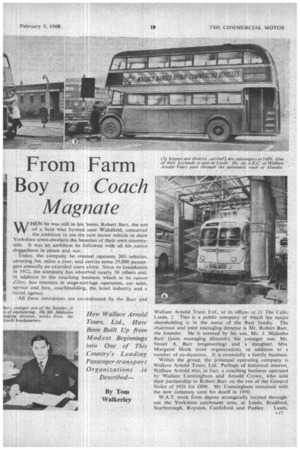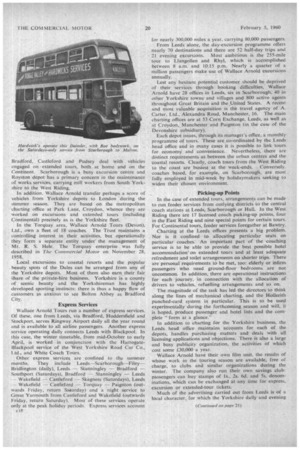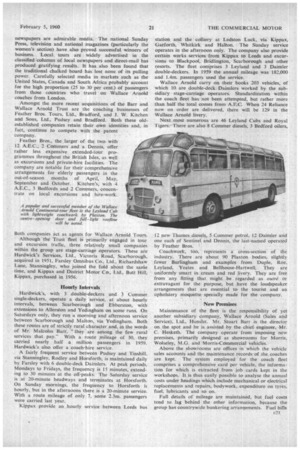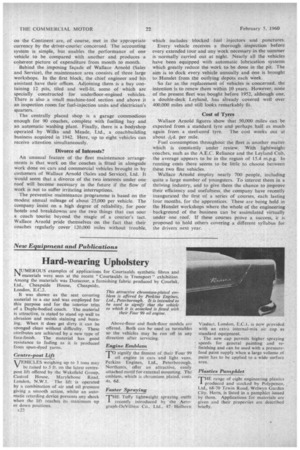From Farm
Page 63

Page 64

Page 67

Page 68

If you've noticed an error in this article please click here to report it so we can fix it.
Boy to Coach
Magnate
WHEN he was still in his 'teens, Robert Barr, the son of a Scot who farmed near Wakefield, cOnceived the ambition to use the new motor vehicle to show Yorkshire town-dwellers the beauties.of their own countryside. It was 'an ambition he followed with all his native
doggedness in peace and war. •
Today, the company he created operates 203 vehicles. covering 5m. miles a year, and carries some 55,000 passengers annually on extended tours alone. Since its foundation in 1911 the company has absorbed nearly 50 others and. in addition •to the coaching business which is, its raison dare. has interests in stage-carriage operation, car sales, service and hire, coaehbuilding, the hotel industry and a
travel agency. . , All these, enterPrises are co-ordinated by the Barr and
How Wallace Arnold Tours, Ltd., Have Been Built Up from Modest Beginnings into One of This Country's Leading Passenger-transport Organizations is
Described—
By Tom Walkerley
Wallace Arnold Trust, Ltd., at its offices at 21 The Calls, Leeds, 2. This is a public company of which the major, shareholding is in the name of the Bari family. Ile chairman and joint managing director is Mr. Robert Barr. the founder. He is assisted by " his son, Mr. J. Malcolm Barr (joint managing director), his . younger son, Mr. Stuart A.. Barr (engineering) and adaughter, Mrs. Margaret Hook (tour organization), in addition to a number of co-directors. It is essentially a family business.
Within the group, the principal operating company is Wallace Arnold Tours, Ltd. Perhaps of historical interest, Wallace Arnold was, in fact, a.coaching business operated by Wallace Cunningham and Arnold Crowe, who sold their partnership to Robert ,Barr on The eve of the General Strike of 1926 for £300. Mr. Cunningham remained with the new company until his death' in 1950.
W.A.T. work from depots strategically located through-' out the Yorkshire catchment area, at Leeds, Bradford, Scarborough, Royston. Castleford and Pudsey. Leeds, Bradford, Castleford and Pudsey deal with vehicles engaged on extended tours, both at home and on the Continent. Scarborough is a busy excursion centre and Royston depot has a primary concern in the maintenance of works services, carrying mill workers from South Yorkshire to the West Riding.
In addition, Wallace Arnold transfer perhaps a score of vehicles from Yorkshire depots to London 'during the summer season. They are based on the metropolitan charting office at Park Lane, Croydon. whence they are worked on excursions and extended tours (including Continental) precisely as is the Yorkshire fleet.
• In the Torquay area, Wallace Arnold Tours (Devon), Ltd., own a fleet of 18 coaches. The Trust maintains a controlling interest in their activities, but operationally they form a separate entity under' the management of Mr. R. S. Hele. The Torquay enterprise was fully described in The Commercial Motor on November 28, 1958.
Local excursions to coastal resorts and the popular beauty spots of the Dales can be arranged from any of the Yorkshire depots. Most of them also earn_ their fair share of the private-hire business. Yorkshire is a county of scenic beauty and the Yorkshireman has highly developed sporting instincts: there is thus a happy flow of customers as anxious to see Bolton Abbey as Bradford City.
Express Services
Wallace Arnold Tours run a number of express services. Of these, one from Leeds, via Bradford, Huddersfield and Stockport. serves Ringway Airport daily all the year round and is available to all airline passengers. Another express service operating daily connects Leeds with Blackpool. In this case, the winter timetable, from mid-October to early April, is worked in conjunction with the HarrogateBlackpool service of the West Yorkshire Road Car Co., Ltd.. and White Coach Tours.
Other express services are confined to the summer months. They include Leeds—Scarborough—Filey-Bridlington (daily), Leeds — Stanningley — Bradford — Southport (Saturdays), Bradford — Stanningley — Leeds Wakefield — Castleford Skegness (Saturdays), Leeds Wakefield — Castleford — Torquay — Paigriton (outwards Friday, return Saturday) and a night service to • Great Yarmouth from Castleford and Wakefield (outwards Friday, return Saturday). Most of these services operate only at the peak holiday periods. Express services account for nearly 300,000 miles a year, carrying 80,000 passengers. From Leeds alone, the day-excursion programme offers nearly 70 destinations and there are 52 half-day trips and 21 evening excursions. Most ambitious is the 255-mile • tour to Llangollen and Rhyl. which is accomplished between 8 a.m. and 10.15 p.m. Nearly a quarter of a million passengers make use of Wallace Arnold excursions annually.
Lest any hesitant potential customer should be deprived of their services through booking difficulties, Wallace Arnold have 28 offices in Leeds, six in Scarborough, 40 in other Yorkshire towns and villages and 800 active agents throughout Great Britain and the ,United States. A recent and most valuable acquisition is the travel agency of A. Carter, Ltd., Alexandra Road, Manchester, 16. The main charting offices are at 53 Corn Exchange, Leeds, as well as at Croydon, Manchester and Paignton (in the case of the Devonshire subsidiary).
Each depot issues, through its manager's office, a monthly programme of tours. These are co-ordinated by the Leeds head office and in many cases it is possible to link tours for economy and convenience. Nevertheless, there are distinct requirements as between the urban centres and the coastal resorts. Clearly, coach tours from the West Riding to the coast are busiest . at the week-ends. Conversely. coaches based, for example, on Scarborough, are most fully employed in mid-week by holidaymakers seeking to widen their chosen environment.
Picking-up Points
In the case of extended tours, arrangements can be made to run feeder services from outlying districts to the central coach stations at Leeds, Scarborough or Hull. In the West Riding there are 17 licensed coach picking-up points, four in the East Riding and nine special points for certain tours. For Continental tours, feeder services foregather at Bavvtry.
Charting at the Leeds offices presents a big problem. Nor is it confined to allocating particular seats on particular coaches: An important part of the caching service is to be able to provide the best possible hotel accommodation' on extended tours and at least adequate refreshment and toilet arrangements on shorter trips. There are personal requirements to be met, too: elderly or infirm passengers who need ground-floor bedrooms are not uncommon. In addition, there are operational instructions for each journey, in connection with the allocation of drivers to vehicles, refuelling arrangements and so on.
The magnitude of the task has led the directors to think along the lines of mechanical charting, and the Hollerith punched-card system in particular. This is to be used experimentally during the forthcoming season and will, it is hoped, produce passenger and hotel lists and the complete "form at a glance."
In addition to charting for the Yorkshire business, the Leeds head office maintains accounts for each of the depots, handles purchasing matters and deals with all licensing applications and objections. There is also a large and busy publicity organization, the activities of which cost some 00,000 a year.
Wallace Arnold have their own film unit, the results of whose work in the touring season are available, free of charge, to clubs and similar organizations during the winter. The company also run their own savings club: passengers can buy stamps of Is.. 2s. 6d. and 5s. denominations, which can be exchanged at any time for express, excursion or extended-tour tickets.
Much of the advertising carried out from Leeds is of a local character, for which the Yorkshire daily and evening
newspapers are admirable 'media. The national. Sunday Press, television and national magazines (particularly the women's section) have also proved successful winners of business. Local tours are widely advertised in the classified :columns of local newspapers and direct-mail has produced gratifying_ results. It has.aiso been found that the traditional chalked board has. lost none. of its pulling power. Carefully selected media in markets such as the United States, Canada and South Africa probably account for the high proportion (25 to 30 per cent.) of passengers from those countries who travel on Wallace Arnold coaches from London.
Amongst the more recent acquisitions of the Barr and Wallace Arnold Trust are the coaching businesses of Feather Bros. Tours, Ltd., Bradford, and J. W. Kitchen and Sons, Ltd., Pudsey. and Bradford. Both these oldestablished companies retain their .own identities and, in fact, continue to compete with .the parent company.
Feather Bros., the .larger of the two with 12 •A.E.C., 2 Cornmers" and -a Dennis, offer rather less expensive extended-tour programmes throughout the British Isles, as well as excursions and private-hire facilities. The company are notable for their comprehensive arrangements for elderly passengers in the out-of-season . months of April, • May, September and October. Kitchen's, with 4 A.E.C., 3 Bedfords and 2 Commers, concentrate on local excursions and hire-work-.
Both companies act as agents for Wallace Arnold Tours.
Although the Trust fleet is primarily engaged in tour and excursion traffic, three relatively small companies within the group are stage-carriage operators. These are Hardwick's Services, Ltd., Victoria Road, Scarborough, acquired in 1951, Farsley Omnibus Co., Ltd., Richardshaw Lane, Stanningley, who joined the fold about the sarne time, and Kippax and District Motor Co., Ltd., Butt Hill, Kippax, purchased in 1956.
Hourly Intervals Hardwick's, with 3 double-deckers and 3 Commer. single-deckers,. operate a daily, service, at about hourly intervals, between Scarborough and Ebberston, with extensions to Allerston and Yedingham on some runs. On Saturdays only, they run a morning and afternoon service between Scarborough and Malton, via Yedingham. Both these routes are of strictly rural character and, in the words of Mr. Malcolm Barr, "they are among the few rural services that pay." With a route rnileage of 30, they carried nearly half a million passengers in 1959. Hardwick's also offer a coach-hire service.
Ilk fairly frequent service between Pudsey. and Tinshill. via Stanningley, Roclley and Horsforth, is maintained daily by Farsley with 6 double-deck Daimlers. At peak periods, Mondays to Fridays, the frequency is 15 minutes, extending to 30 minutes at the off-peaks. The Saturday service is at 20-minute headways and terminates at Horsforth. On Sunday mornings, the frequency to Horsforth is hourly, but in the afternoons there is a 20-minute service. With a route mileage of only 7, some 2.3m. passengers were carried last year.
Kippax provide an hourly service between Leeds bus station and the colliery at Ledston Luck, via Kippax, Garforth, Whitkirk and Halton. The Sunday service operates in the afternoon only. The company also provide certain works services from Kippax to Leeds and excursions to Blackpool, Bridlington, Scarborough and other resorts. The fleet comprises 3 Leyland and 3 Daimler double-deckers. In 1959 the annual mileage was 182,000 and 1.4m. passengers used the service.
Wallace Arnold carry on their books 203 vehicles, of which 10 are double-deck Daimlers worked by the subsidiary stage-carriage operators. Standardization within the coach fleet has not been attempted, but rather more than half the total comes from A.E.C. When 24 Reliance now on order are delivered, there will be 129 in the Wallace Arnold livery.
Next most numerous are 46 Leyland Cubs and Royal Tigers. There are also 8 Commer diesels, 3 Bedford oilers, 12 new Thames diesels, 5 Commer petrol, 12 Daimler and one each of Sentinel and Dennis, the last-named operated by Feather Bros.'
Coachwork, too, represents a cross-section of the industry, There are about 90 Plaxton bodies, slightly fewer Burlingham and examples from Duple, Roe, Leyland, Yeates and Bellhouse-Hartwell. They are uniformly smart in cream and red livery. They are free from any fitting that might be regarded as outré or extravagant for the purpose, but have the loudspeaker arrangements that are essential to the tourist and an upholstery moquette specially made for the company.
New Premises • Maintenance of the fleet is the responsibility of yet another subsidiary company, Wallace Arnold (Sales and Service), Ltd., Hunslet. Mr. Stuart Barr is the director on the spot and he is assisted-by the chief engineer, Mr. C. Hesketh. The company operate from imposing new premises, primarily designed as showrooms for Morris. Wolseley, M.G. and Morris-Cammercial vehicles.
Above the showrooms are offices in which the vehicle sales accounts and the maintenance records of the coaches are kept. The system employed for the coach fleet comprises a comprehensive card per vehicle, the information for which is extracted from job cards kept in the workshops. It is thus easily possible to analyse the annual costs under headings which include mechanical or electrical replacements and repairs, bodywork, expenditure on tyres, fuel, lubricants and so on.
Full details of mileage are maintained, but fuel costs tend to lag behind the other information, because the group has countrywide bunkering arrangements. Fuel bills F21
on the Continent are, of course, met in the appropriate currency by the driver-courier concerned. The accounting system is simple, but enables the performance of one vehicle to be compared with another and produces a coherent picture of expenditure from month to month.
Behind the imposing facade of Wallace Arnold (Sales and Service), the maintenance area consists of three large workshops. In the first block, the chief engineer and his assistant have their offices. Adjoining them is a bay containing 12 pits, tiled and well-lit, some of• which are specially constructed for underfloor-engined vehicles. There is also a small machine-tool section and above it an inspection room for fuel-injection units and electrician's quarters.
The centrally placed shop is a garage commodious enough for 90 coaches, complete with fuelling bay and an automatic washing plant. Finally, there is a bodyshop operated by Wilks and Meade, Ltd., a coachbuilding business acquired in 1942. Here, up to eight vehicles can receive attention simultaneously.
Divorce of Interests?
An unusual feature of the fleet maintenance arrangements is that work on the coaches is fitted in alongside work done on cars and commercial vehicles brought in by customers of Wallace Arnold (Sales and Service), Ltd. It would seem that a divorce of the two interests under one roof will become necessary in the future if the flow of work is not to suffer irritating interruptions.
The preventive maintenance programme is based on the modest annual mileage of about 25,000 per vehicle. The company insist on a high degree of reliability, for poor hotels and breakdowns are the two things that can sour a coach tourist beyond the magic of a courier's tact. Wallace Arnold pride themselves on the fact that their coaches regularly cover 120,000 miles withottt trouble. which includes blocked fuel •injectors and punctures.
Every vehicle receives a thorough inspection before every extended tour and any work necessary in the summer is normally carried out at night. Nearly all the vehicles have been equipped with automatic lubrication systems which greatly reduce the work to be done in the pit. The aim is to dock every, vehicle annually and One is brought to Hunslet from the outlying depots each week.
So far as the replacement of vehicles is concerned, the intention is to renew them within 10 years. However, none of the present fleet was bought before 1952, although one, a double-deck Leyland, has already :covered well over 400,000 miles and still looks remarkably fit.
Cost of Tyres Wallace Arnold figures show that 50,000 miles, can be expected from a standard tyre and perhaps half as much again from a steel-cord tyre. The cost works out at about ilvd. per mile.
• Fuel consumption throughout the fleet is another matter which is constantly under review. With lightweight coaches, such as the A.E.C. Reliance and the Leyland Cub, the average appears to be in the region of 15.4 m.p.g. In running costs there seems to be little to choose between these two fine vehicles.
Wallace Arnold employ nearly 700 people, including quite a large number of youngsters. To interest them in a thriving industry, and to give them the chance to improve their efficiency and usefulness, the company have recently inaugurated the first of a series of courses, each lasting four months, for the apprentices. These are being held in the Hunslet workshops where the whole of the engineering background of the business can be assimilated virtually under one roof. If these courses prove a success, i is proposed to hold others covering a different syllabus for the drivers next year.




























































































































